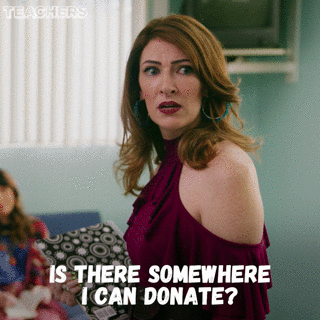There's something about that emergency text sent out to all students alerting them that classes are canceled due to severe weather that makes everyone let out a sigh of relief and satisfaction. Let's face it, we all love getting our classes canceled. These surprise mini-vacays give us university students so much more free time and we oftentimes don't even know what to do with ourselves.
While cancelled classes come as a pleasant surprise to some of us, it is important to remember the oncoming, potential danger many students and homes in your area. The threat of natural disasters is serious and should never be made light of. Here's a list of ten things I think of doing when I hear classes were cancelled to help pass the time for students and to become conscious of those who may be severely affected by this stressful time.
1. Catch up on sleep!

When classes are canceled, one of the first things most college students do is catch up on sleep. It's nice to have a week off from late-night studying or cramming for a test. Rest up and catch up.
2. Open your home up for students who don't have a place to evacuate to.

Whether a snowstorm or hurricane warning, if your university issues an evacuation warning ask around if students need a place (if you can accomodate them). A lot of out-of-state and international students may not be able to go back to their home, and may not be able to afford temporary places to stay. Make sure to reach out and watch out for your peers!
3. Binge-watch movies or shows to pass the time.

With a mini-break comes opportunity to just sit around and do nothing. Whether reruns of your favorite show, or watching all the new hit rom-coms in one sitting, enjoy this time cooped up inside with some TV therapy.
4. Donate extra cans of food, bottles of water and household necessities to homeless shelters and donation centers.

If you're at home or in your dorm, you are lucky to have a roof over your head to protect yourself from dangerous weather. However, be mindful that many don't have that privilege. If you have any extra supplies lying around, donate some to help make someone's life a little easier.
5. Do some at-home workouts to keep up with your exercise if leaving your home is not an option.

Live a #NoExcuse life and keep up with your exercise, regardless of the weather! A lot of exercise trainers on YouTube like Whitney Simmons offer really great at-home exercise routines you can stay safe and fit at the same time.
6. Offer to take those without a car supply-shopping to stock up on batteries, flashlights, generators and more.

Some students on campus may not have a car to get supplies to sustain themselves during the period of inclement weather. Give back by driving them to get some supplies they might need so they, too can feel comfortable during this time.
7. Board games!

Considering the possibility that your power might go out, you'll need something to do to pass the time, right? Bring back board games! They're great for when hanging out with friends, family, or floormates and you'll probably get really close to those around you. Being cooped up inside doesn't have to be boring!
8. Donate platelets and blood at donation centers like American Red Cross in your area.

Something many people don't know is that during times of severe weather, there is a large influx of blood shortages. If you're willing and able, donate blood or platelets to help save someone's life in times of stress within your community.
9. Clean out your room or closet.

Take this time cooped up in your room or house to stay organized. It's never to late for a spring cleaning, and what more productive way to spend the time is there than rearranging your space to make yourself more productive in the future?
10. Stay aware.

Whether your friends, family, or strangers, watch out for those around you. During times of stress, most people think only of themselves to avoid the potential dangers of severe weather. If someone is having a difficult time during extreme weather warnings, check in to make sure they're prepared and do your best to support them in order to make them feel prepared. Some may not have the financial resources, physical capacity or sense of community to feel safe, so do your best to change that. Share your best tips to prepare, resources they can utilize or services at hand in case of emergency or concern.
Above all, stay safe and enjoy this time off from classes!



















